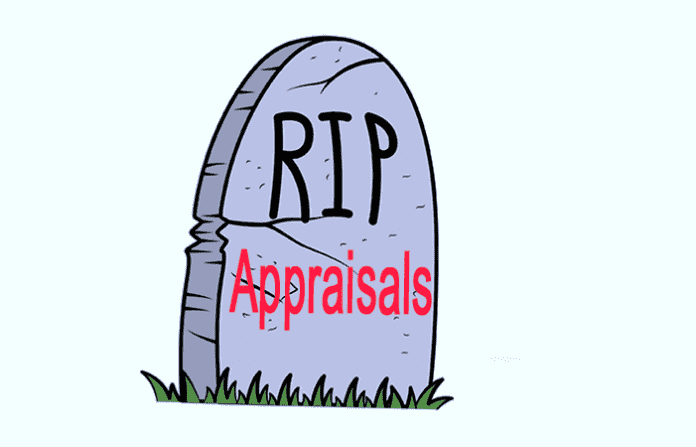Performance Management and appraisals has been a topic of several discussions debate and research over the last decade. Since 2012, when Kelly Services decided to drop appraisals, it became the year where one of corner stones of good HR- Performance Management was challenged. From 2012- 2019, as Josh Bersin says 70% of global organisations are at different stages of transition of relooking or having already changed their performance management process, emphasising on regular conversations.
The purpose of this article is to share perspective of finding out what’s right for your company and what can be certain guiding factors as performance appraisal evolves.
While we seek answers, it goes back to asking – “What started the wheels of change in performance management in the first place?”
The analogy is the business context evolving over last decade with constant change, and words like VUCA, Agility, Real Time information or decision making becoming a constant while looking at business strategy, there have been compelling reasons for anything measuring performance has to be “AGILE”
Sometimes I wonder what took decades for us to realise that human performance also must be measured in time just like stock performance- or quarterly results. Given that there is human effort in performance, perhaps daily tracking may be difficult, however any timeline which is quick, allows the person for enough time to act became a guiding factor.
In HBR article- The Performance Management Revolution further quotes “the main reason more and more companies are dropping annual reviews—is this: With their heavy emphasis on financial rewards and punishments and their end-of-year structure, they hold people accountable for past behaviour at the expense of improving current performance and grooming talent for the future, both of which are critical for organizations’ long-term survival”.
While we explore what is the future and what is a good process for you, I urge corporates to ask what the purpose of performance management is. What’s purpose in your company? How is performance management being used right now? Are decisions on employees based on output from performance management system or is the exercise independent.
No purpose will be served if the exercise of performance management is to make a tick-mark and decisions on career, development, growth are not linked. As one determines what is good for them the below guidelines may help.
What does your business need today?
A business exists to deliver results – performance management exists to give an indication of how well the people who contribute to that business are doing.
If the purpose of business is to evaluate effort against outcomes, performance management and methods of evaluating performance will exist and continue
This remains the same for any scenario where one wants to measure performance – an NGO, school even home. Honest dialogue with business leaders, looking at state of business and employee effort- one may discover what the best method is.
For example, if business is technology where changes are every day, projects which have fixed timelines, daily client feedback- the key need for the performance system is anything which gives employees and managers way to anticipate issues, guide employees and take corrective action. A quarterly system of feedback may not work; perhaps quick weekly system may work. Including business in the conversation gets an alignment of what may be important for them and solicits their commitment. A large medical technology company, which gave up ratings several years ago, is resurrecting them now that it has acquired another company, which has a more traditional view of performance management. In a nutshell, there is no one size fits all; the future depends on what you want to make of it. Seek answers to questions like:
- What soon should we let our people know so that they can take corrective action?
- What can our people do better or change?
- Does the process tell them what should they do specifically and in time?
- What should be frequency of setting goals or re-evaluating them?
- Whose feedback should employees get so that actions can be more focused? If peers’ feedback or clients’ feedback makes sense, then it can be part of the system.
- Does business value the time they will spend for taking actions for the running system effectively? If they find value, they will take accountability.
Are you culturally ready? Where are you on the curve of your people practices?
This is a tough question which needs candid conversation and honest answers. We may be constantly tempted by wanting to be the next best thing in HR and being trend setter by having “cool” performance management processes unfortunately which may remain on paper or done as a tick mark if the culture is just not ready. There is a definite shift towards process which is technology savvy, higher frequency of dialogue, and gives proactive update for taking action. However, you are the judge of where organisation is, and what boundaries are to be challenged. Shuffle carefully between challenging the status quo and moving the process ahead by answering how will this process push my organisation ahead?
Another trend is dismissing ratings and the bell curve. There will always be a limited resource to be distributed with certain rationale amongst employees. Where one should gauge cultural readiness is use of methods to differentiate performance. A growing trend of dismissing ratings or bell curve can be counterproductive if the culture isn’t ready. Like I mentioned, maintain the balance by answering- will it take your organisation towards desired objectives.
Is process FAIR?
Most pertinent questions-
- Is it FAIR assessment for organisation and gives it reflection of performance?
- Is it fair to employee and differentiates performance?
- Does it create culture of accountability?
- Is the system giving heads-up for development?
- Is it giving enough information to employee for career decisions or helping organisation develop them?
In most cases the changes in performance management happened when the process wasn’t reflecting true organisational performance or was creating an illusion. Fairness can be interpreted in several ways in case of performance management – where we often have rewards linked to performance – the question to ask is if it does justice to the effort deployed by employee in context of organisational performance.
So, what is the FUTURE?
The future lies in answers to questions with the guidelines for what works for your organisation. Technology is an enabler can make the process user friendly, quickly and adds value to the time spent in the exercise. This is provided people start valuing this time. A system is as good as it is being used. Technology can’t solve problems which are inherent in organisation culture.
What to watch out for?
We need to be aware for why we are choosing to make a change or not make a change and do so for the right reasons. Most common pitfalls to avoid are:
- Falling prey to the desire to stand outand launch another #METOO campaign, the happening thing in performance management which becomes a talking point and wins accolades. It may not add any value and will remain a tick mark exercise.
- Adopt the other end stating- we are not ready, because we choose to remain in a comfort zone. Again, the question to ask is- How is my current process building capacity for future?
Trends may keep moving; decide the future depending on what value the process should add for your business.
Bibliography- 2016-The Performance Management Revolution- HBR – by Peter Cappelli and Anna Tavis, 2015-Is the Annual Performance Review Dead? – SHRM, After the Storm5 years of Performance Management Mark Effron, https://hbr.org/2015/04/ reinventing-performance-management https://hbr.org/2016/11/lets-not-killperformance-evaluations-yet









